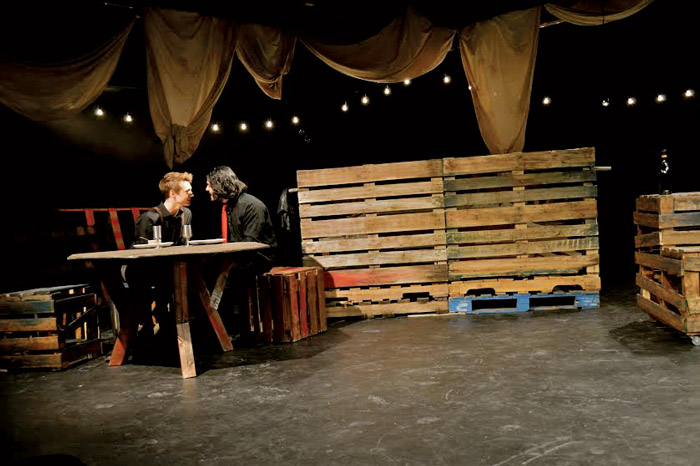If there’s a single universal truth to social interaction, it’s that people will say anything if they think it will convince the person they like to sleep with them. It was true in 1920 when Arthur Schnitzler’s play La Ronde debuted in Berlin to a shocked and offended crowd, and it’s true now in Players’ Theatre’s production of the same play—now redubbed Round Dance to avoid confusion with the amusement park. This production will also likely astonish crowds like it did in the ’20s, but for a different reason: It’s fantastic.
Round Dance follows five actors playing ten roles across ten interconnected vignettes. It begins with a chance encounter between a prostitute and a soldier, as she offers him her services and he eventually relents. Each subsequent scene contains a character from the previous one, engaging in the same pattern of pre and post-coital push-and-pull that the first scene established. The circle is closed when the prostitute from the first scene reappears in the final scene. What’s interesting about the play is the radically different reactions the same characters have in what’s more or less the same scenario—characters may be subservient in one scene and domineering in the next; tender or excited; coercing or coerced. The difference is how they decide to act based on who they’re with at that moment.
It’s also interesting to note the ways that things don’t change. The play seems most interested in the power dynamics that are the common denominator to most sexual encounters, and how sex can be used to cement people’s sexual roles along the lines of power, class, and gender. This commonality is underlined by Hannah Kirby’s assured direction, making the inspired choice to have each actor play two of the different roles. It allows the shadows of past lovers to flit about on the fringes of a scene as waiters or passersby, implicitly reminding the characters that they’ve been in this situation before and they’ll likely be there again. This idea is also bolstered by a sense of symmetry that pervades every inch of the production, going beyond the circular conceit of the script. The beginning and ending of each scene tend to mirror each other, drawing parallels between the desire and satisfaction—or lack thereof—that bookends sex.
The doubling of roles also allows each actor to showcase a whole range of emotions that would have been limited by having only one part to play. They are all able to grasp the inherent absurdity and hypocrisy of their characters and still mine humor and pathos from them with a professional level of subtlety—all actors are able to sink their teeth into their part without swallowing it whole. Praise also goes to Kirby for getting such real and naturalistic performances out of the actors, who nail the pauses and tics of intimate conversation, making the audience feel all of the joy and discomfort that comes with private dialogue.
The set is sparse yet highly versatile, made almost entirely of reconstituted shipping pallets that are reconfigured in a number of ingenious ways to suit the background of each particular scene. Lighting and staging are also fine-tuned to fit the context of scenes, with the lighting in particular doing a lot of the heavy lifting. It’s able to realistically transport the audience from the highlight of an outdoor afternoon to the simulated dimness that comes standard with late-night pillow talk.
It’s important to consider how ideas of sex have changed since the play was written in 1897, because that evolution is clearly on the minds of those involved in the production. As a society, we like to think we’re more ‘sex positive’ than the people of the late 19th century, but this play smartly doesn’t let the audience off of the hook so easily. Discourse has changed, and things have gotten much better since then, of course, but this production argues that we’re still the same as our predecessors in a lot of ways—desperately grasping at intimacy and human connection, debasing each other with our desires, and fumbling around in the dark—alone together.
Round Dance runs at the McGill Player’s Theatre on the third floor of the SSMU building from Wednesday, Feb. 18 to Saturday, Feb. 21 and Wednesday, Feb. 25 to Friday, Feb. 27 at 8:00 pm. Tickets are $6 for students and senior citizens, and $10 for non-students.








